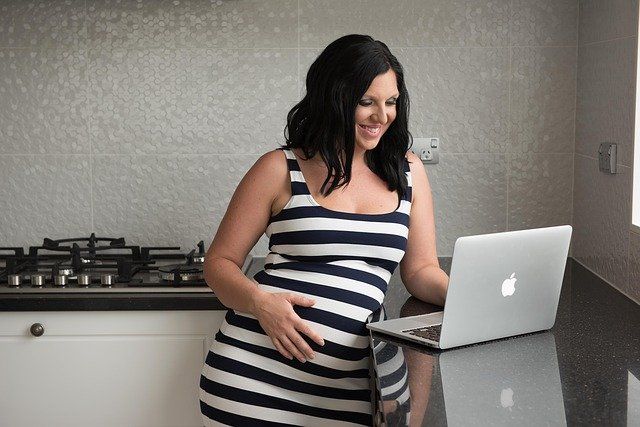Is pregnancy anxiety normal? Will worrying affect my baby? What can I do to feel normal? We share everything you need to know about experiencing pregnancy anxiety, and explain how you can feel calmer and more in control
Beneath the ‘pregnancy glow’, the ‘exciting times’, and the months of planning and preparation, can lay a whole host of emotions you may not have been expecting to experience. Anxiety, stress, worry, fear. Whether you’re a first-time mum who doesn’t quite know what to expect, or are already a parent who has faced a tough past pregnancy or birth, feeling apprehensive is completely natural.
We all feel anxious from time to time, but did you know that anxiety is one of the most common mental health problems we experience? Around one in four of us will experience a mental health problem each year, and for expectant mothers and fathers, that’s no different.
According to a study by King’s College London released in 2018, one in four pregnant women will experience a mental health problem whilst they are expecting. Of the 545 women who were interviewed, 15% were seen to be experiencing anxiety, with a further 11% experiencing depression.

When does anxiety become a problem?
No matter what your journey to becoming pregnant may have involved, pregnancy itself is a huge, life-changing event – it’s only natural to feel anxious, unsure, or scared at times. Hormonal changes can play havoc with your emotions, which can lead to you feeling even more worried.
Hearing second-hand ‘horror stories’ from friends, family, or even the media can also exacerbate how worried and apprehensive you are feeling. Almost all of us have that one family member, friend, or friend of a friend, who had a tough pregnancy or traumatic labour. Or perhaps you’ve been watching shows about pregnancy and labour to help you know what to expect. Either way, by surrounding ourselves with these dramatic or traumatic retellings of negative birth or pregnancy experiences, it can cause us to become more worried about what is to come.
While there’s no such thing as a ‘normal’ level of anxiety (we all feel and experience worries to different degrees), it is completely natural to feel some level of anxiety and worry. Whether that’s about pregnancy symptoms, your baby’s development and health, worries about money, work, if you’ll be a good parent, or even apprehension about how your relationships with your partner, friends, and family may change over the coming weeks and months - feeling worried is, in many ways, part of the process!
If you start to feel anxious all of the time, your worrying thoughts outweigh your everyday thoughts, or you find your anxiety is interfering with your day-to-day life, you may benefit from seeking support to help you manage these feelings.
Anxiety can include a wide range of physical and psychological symptoms, including:
- fast breathing
- sweating, dizziness, or nausea
- a rapid or irregular heartbeat
- trouble sleeping or concentrating
- feeling irritable, restless, or short-tempered
- panic attacks
- difficulty controlling or stopping anxious thoughts
- feeling on edge, nervous, or anxious a lot of or most of the time
If you are experiencing antenatal or prenatal anxiety (anxiety while you are pregnant), postnatal anxiety (during the first year after your child is born), or perinatal anxiety (anytime from becoming pregnant to a year after giving birth), it’s important that you speak with your GP, midwife, or consultant to talk about how you are feeling. By reaching out to speak with a professional, they can help to assess your symptoms and how you are feeling, discussing any treatment options that are available in your area and helping find what will work best for you.
Getting help and support for anxiety can help you to reduce physical and psychological symptoms, teaching you coping methods that you can use to help manage your feelings so that they no longer feel overwhelming.

What support is available?
Depending on your individual circumstances and what is available in your local area, there are many treatment options that you could be offered. According to NICE (the National Institute for Health and Care Excellence), you should be offered talking therapies before prescription medication.
Counselling for anxiety is one of the most common forms of treatment offered. By talking with a therapist, you can uncover specific causes or triggers for your anxiety and how you are feeling, as well as coping techniques to manage these feelings moving forward. CBT (cognitive behavioural therapy) is a commonly recommended form of talking therapy that can help you recognise how your thoughts affect your feelings and behaviour, helping you to break overwhelming problems into smaller, more manageable tasks.
How can I manage pregnancy anxiety?
There are plenty of different ways you can try to help you manage feelings of worry and anxiety. Trying different methods can help you to discover what works best for you; there’s often no right or wrong way to find help. The most important thing is that you have recognised that your worries may be having a negative impact on you, and you are trying to find a way to help yourself feel better.
Develop your support network
Having people you can rely on and turn to is important now more than ever, as you start this new phase of your life. Becoming a parent is a huge life experience, filled with change, challenges, stress, and expectations. Building and developing your support network can be key to setting yourself up for success.
If you have a partner, they can be a key source of emotional support - but it’s important to make sure that they aren’t your sole source of help. Having an outside party you can turn to, who isn’t experiencing the same ups and downs, can help by offering a different perspective on events or worries.
Friends and family can offer a great deal of support. By doing your best to be open and honest about how you are feeling, this can help them to recognise signs that you might be struggling, and encourage them to reach out and offer help without prompting. When something is worrying us, it can feel like the most obvious thing in the world - but from the outside, it might not be so clear that you’re struggling.

Attending antenatal classes (also known as parentcraft classes) can not only help you to feel more prepared and confident about your baby’s birth, but also provides a great opportunity to meet other soon-to-be parents who are going through a similar journey. This can be a great way to make new friends, share tips, and talk with others who are expecting babies around a similar time as you.
If making new connections in person sounds a bit overwhelming or isn’t possible right now, there are plenty of online forums, apps, and groups you can join - for free - to meet other parents. Facebook offers local and general groups for expecting and new parents, whilst forums like Mumsnet are well-known for offering advice and support on everything from conception to dealing with teens (and all the bits in between).
Apps like Peanut help women chat, meet, and learn from other like-minded women about fertility and motherhood, while Mush - the self-proclaimed ‘friendliest app for mums’ can help you to make friends who live near you with children the same age, arrange meetups, get advice, and join groups based on your interests.
Keep a diary
Regularly writing in a digital or physical diary can help you to track your feelings, record when you are feeling anxious, and begin noticing patterns or triggers that you may have. Try to write down when, what, and how you are feeling; this can help you to pick up on not only what is causing you the most anxiety, but also to work out what helps you feel calm and in control.
Try holistic therapies
There is some evidence to support the effectiveness of complementary therapies during pregnancy. Massage and aromatherapy can be particularly effective if you are experiencing anxiety, whilst acupressure or taking ginger can help with morning sickness.
To find out more about common types of holistic and complementary therapies, and how they could help you to feel less stressed during pregnancy, visit Therapy Directory.
Open up with your employers and colleagues
Not everyone may feel comfortable with this, but having a supportive work environment can be key to helping you feel calm and avoiding feeling overwhelmed at work. You’re already anxious about so many things - with an understanding boss and colleagues, work doesn't have to be one of them.
You may not need to tell your employer you are pregnant until 15 weeks before your due date, but telling them sooner can help to reduce some of the anxiety around taking time off for antenatal appointments, as well as helping you to avoid any worries around pregnancy symptoms while at work, such as morning sickness, mood swings, or feelings of overwhelm.
Explore hypnobirthing for labour fears, stress, pain, and birth anxiety
Hypnobirthing (hypnosis for childbirth) can help you to create a more relaxed, calm environment and mood, reducing feelings of stress, anxiety and fear whilst in labour.
The more tense, anxious, or stressed you feel during labour, the more likely you are to feel pain as your body releases stress hormones (such as adrenaline). This can mean that blood is pushed towards the bigger muscle groups in your limbs as your body prepares for ‘fight or flight’, which means your womb doesn’t get as much blood or oxygen, which can make these muscles less efficient. As you feel more stressed, your body is also less likely to produce ‘love hormones’ which can naturally help ease the pain of labour. Feeling calm, relaxed and in control really is an important part of preparing for labour!
Hypnotherapy can help you to learn the skills and techniques needed to feel less anxious and more prepared. Typically recommended to begin around 25-30 weeks into pregnancy, you can still benefit from hypnobirthing classes (in-person or online, as a group, with your partner or solo) at any point during your pregnancy. Just learning some of the basic techniques and premises can be an immense help.

If you are particularly anxious about giving birth or labour pain, hypnobirthing can help you to reframe giving birth in a more positive light. Instead of focusing on what could go wrong, anticipating pain, or dwelling on other people’s negative experiences, hypnobirthing classes can encourage positive language, teach you self-hypnosis techniques, visualisation, and breathing exercises. Designed to help you gain a sense of control, reduce anxiety, and ease stress, your hypnotherapist can also help you learn more about ideal positions to help shorten the length of labour, as well as providing materials to help you continue to practice the techniques at home.
Digital Marketing Executive Melissa Marney shares her experiencing with hypnobirthing and generalised anxiety disorder (GAD).
“From the moment I discovered I was pregnant I was terrified about giving birth. As someone who suffers with GAD, being a first time mum and not knowing what to expect left me feeling really anxious.
“I decided to try hypnobirthing. I had heard about it in the media and from a couple of friends who knew women who had tried it and thought I’d give it a try. I found this wonderful hypnotherapist who made me feel so comfortable and recorded each of our sessions so I was able to practice at home too. From the first session, I noticed a drop in my anxieties about labour.
“Closer to my due date I had to be induced so hypnotherapy helped me cope really well with this sudden change of plans. I listened to my recordings during labour which helped to relax and ground me.”
Discover more about how hypnotherapy can help you feel less pain during labour, how hypnotherapy can help with birth fears, and how to adapt if your birthing partner can no longer be present during labour.
Take a look at your diet
What you eat not only has a big impact on how your baby is growing - it also can affect your mental health. More and more research is highlighting the impact food and nutrition can have on our overall mental wellness, as well as the impact it can have on specific mental illnesses including anxiety and depression.
The more well-rounded and nutrient-rich your diet is, the more it can help to improve your mood, increase your energy levels, and even help you think more clearly. Health nutritionist Charlotte Turner explains how your diet could be affecting how anxious you’re feeling:
“It is not a widely known fact, but certain foods can actually exacerbate anxiety symptoms. I think most people would understand that caffeine may be a trigger mechanism, as it heightens your senses and heart rate. However, despite being aware of this, we may not want to admit it to ourselves, simply because it helps us during work and our busy lives.

“The good news is that, on the food front, the foods we choose to eat can actually help us feel calmer and happier. For example, choosing foods that release tryptophan such as bananas, turkey, and cashew nuts can boost serotonin, aka the happy hormone, in our bodies. Also, when we are stressed or anxious, our bodies can become depleted of certain vitamins and other micronutrients that may need to be rebalanced.
“If you want to learn a few tips and tricks to give your body a real boost to fight back against your anxiety, then speaking to a nutritionist who can help you understand and advise you on foods to consume based on your lifestyle may give you the biggest chance of success.”
Find out more about how nutrition can influence your anxiety levels and how working with a nutritionist can help on Nutritionist Resource.
If you’re worried about your levels of anxiety, or are struggling with any aspect of pregnancy (no matter when your due date, or if you’ve recently given birth), looking after your mental health is so important. The Mental Health Foundation estimates around 50% of perinatal mental health problems go untreated or undetected, which can have a devastating impact on you and your family during a time when you most need help.
By reaching out and getting help and support, you can begin to turn feelings of stress and anxiety back into excitement and joy. So many different factors can cause perinatal mental illness; from hormonal changes to relationship issues, financial worries to insomnia - the causes can vary from person to person, with many people being affected by multiple issues.
Postnatal or perinatal depression can affect you at any time – before or after the birth of your baby. Keeping an eye out for the symptoms, and seeking help is vital to making sure you are being looked after.
If you are worried about how you’re feeling, speaking with a qualified, experienced counsellor or therapist can give you a safe space to vent, talk about your worries, concerns or frustrations in a safe, judgement-free environment. With their help and support, you can talk through your feelings, better understand why they are happening, and learn coping mechanisms and relaxation techniques.


Comments